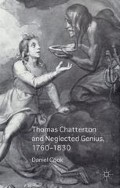Abstract
Independently of Tyrwhitt’s collection, the Oxford don and poet Thomas Warton made his own enquiries into the Rowley papers as he wished to include them — authentic or not — in the medieval chapters of his grand History of English Poetry (1774–81). More so than in the case of Tyrwhitt, Warton’s authority for and methods used in judging the Rowleyana would incur heated discussion within the Rowley controversy over the next half-decade. But, at the same time, his defence of Chatterton’s genius in 1778 directly influenced John Broughton’s edition of the modern works, the Miscellanies in Prose and Verse; by Thomas Chatterton, the supposed author of the poems published under the names of Rowley Canning, &c, which was rushed through the press that July on the back of the success of Tyrwhitt’s Rowley.2 Brought on sought to substantiate Warton’s claim that Chatterton had been ‘a prodigy of genius: and would have proved the first of English poets, had he reached a maturer age’.3
The name of Chatterton, like that of Sterne, is now become so famous, that trash and garbage, if cooked by him … will be greedily swallowed by the undiscerning public.
(Gentleman’s Magazine) 1
Access this chapter
Tax calculation will be finalised at checkout
Purchases are for personal use only
Preview
Unable to display preview. Download preview PDF.
Notes
Miscellanies, pp. ix-x. See Donald S. Taylor, ‘The Authenticity of Chatterton’s Miscellanies in Prose and Verse’, Papers of the Bibliographical Society of America 55 (1961), pp. 289–96.
Jennifer Keith, ‘Pre-Romanticism’ and the Ends of Eighteenth-Century Poetry’, in John Sitter (ed.), The Cambridge Companion to Eighteenth Century Poetry (Cambridge: Cambridge University Press, 2001), pp. 271–91
Walter Graham, English Literary Periodicals (New York: Thomas Nelson & Sons, 1930), p. 180.
Alvin Sullivan (ed.), British Literary Magazines: The Augustan Age and the Age of Johnson, 1698–1788 (Westport, CT: Greenwood Press, 1983), pp. 327–30.
See Gerard Genette, Paratexts: Thresholds of Interpretation, trans. Jane E. Lewin (Cambridge: Cambridge University Press, 1997), p. 51.
Allen Hazen, Bibliography of the Strawberry Hill Press (Folkestone: Dansons of Pall Mall, 1973 [1942]), pp. 118–19.
John Lucas, Miscellanies in Verse and Prose (Salisbury: Printed for the author, 1776)
Anna Williams, Miscellanies in Prose and Verse (London: T Davies, 1766).
Barbara M. Benedict, Making the Modern Reader: Cultural Mediation in Early Modern Literary Anthologies (Princeton: Princeton University Press, 1996)
On voguish modems see Thomas Keymer, Sterne, the Moderns, and the Novel (Oxford: Oxford University Press, 2002).
Thomas Chatterton, The Poetical Works of Thomas Chatterton, ed. Walter W. Skeat, 2 vols (London: Bell and Daldy, 1871), vol. 2, p. xliv.
See Fiona Stafford, The Sublime Savage: A Study of James Macpherson and The Poems of Ossian (Edinburgh: Edinburgh University Press, 1988)
James Macpherson, The Poems of Ossian and Related Works, ed. Howard Gaskill, with an Introduction by Fiona Stafford (Edinburgh: Edinburgh University Press, 1996).
Corinna Laughlin, ‘The Lawless Language of Macpherson’s Ossian’, SEL 40.3 (2000), pp. 511–37.
Some Specimens of the Poetry of the Antient Welsh Bards, ed. Evan Evans (London: R. and J. Dodsley 1764), pp. 7
Life, pp. 299, 356–9; Works, vol. 2, p. 1,026; Chatterton’s Art, pp. 302, 304–10; Forger’s Shadow, pp. 153, 197–8. For further readings of the poems see Wylie Sypher, ‘Chatterton’s African Eclogues and the Deluge’, PMLA 54 (1939), pp. 246–60
Alan Richardson, ‘Darkness Visible: Race and Representation in Bristol Abolitionist Poetry’, Wordsworth Circle 27.2 (1996), pp. 67–73
Kim Ian Michasiw, ‘Chatterton, Ossian, Africa’, SEL 48.3 (2008), pp. 633–52.
See Charles Churchill, The Rosciad (London: W. Flexney 1761)
Published separately by George Kearsley as An Elegy on the Much Lamented Death of William Beckford, Esq. (London: G. Kearsley, 1770)
For Patriotism and Beckford in relation to Bristol see George Rudé, Wilkes and Liberty: A Social Study (London: Lawrence and Wishart, 1983 [1962]), pp. 112–13
Timothy Morton, ‘In Your Face’, Romantic Culture, pp. 79–96. See also Thomas Lockwood, Post-Augustan Satire: Charles Churchill and Satirical Poetry, 1750–1800 (Seattle and London: University of Washington Press, 1979), pp. 17
Douglas J. McMillan uses the poem as an exemplum of Chatterton’s neglected satire: ‘Chatterton’s Minor Satirical Poems’, Neuphilologische Mitteilungen 74 (1973), pp. 311–20.
See Daniel Cook, ‘Authenticity among Hacks: Thomas Chatterton’s Memoirs of a Sad Dog and Magazine Culture’, in Tim Milnes and Kerry Sinanan (eds), Romanticism, Sincerity and Authenticity (Basingstoke: Palgrave Macmillan, 2010), pp. 80–98.
Walpole’s Correspondence, vol. 2, pp. 107 and 110. See also Life, pp. 272 and 416–18; John Nevill, Thomas Chatterton (London: Muller, 1948), p. 106.
Nick Groom, ‘Thomas Chatterton (1752–1770)’, in ODNB (Oxford: Oxford University Press, 2004)
See John Brewer, ‘Commercialization and Politics’, in Neil McKendrick, John Brewer and J. H. Plumb, The Birth of a Consumer Society: The Commercialization of Eighteenth-Century England (Bloomington: Indiana University Press, 1982), pp. 197–262.
Paul Baines, ‘“All of the House of Forgery”: Walpole, Chatterton, and Antiquarian Commerce’, Poetica (1994), pp. 45–72. An edited version appears in Paul Baines, The House of Forgery in Eighteenth-Century Britain (Aldershot: Ashgate, 1999), pp. 151–76.
MR 56 (1777), p. 323. Walpole to William Cole, 19 June 1777, Walpole’s Correspondence, vol. 28, pp. 36, 281–2, and vol. 2, pp. 51–2. See Earl R. Wasserman, ‘The Walpole-Chatterton Controversy’, MLN 54 (1939), pp. 460–2.
Horace Walpole, A Letter to the Editor of the Miscellanies of Thomas Chatterton (Strawberry Hill: T. Kirgate, 1779), pp. 1
E.g., Timothy Mowl, Horace Walpole: The Great Outsider (London: John Murray, 1996), pp. 224–6
Brian Fothergill, The Strawberry Hill Set: Horace Walpole and His Circle (London: Faber and Faber, 1983), p. 37
W. S. Lewis, Rescuing Horace Walpole (New Haven and London: Yale University Press, 1978), pp. 134–41.
Author information
Authors and Affiliations
Copyright information
© 2013 Daniel Cook
About this chapter
Cite this chapter
Cook, D. (2013). Miscellanies and the Moderns. In: Thomas Chatterton and Neglected Genius, 1760–1830. Palgrave Macmillan, London. https://doi.org/10.1057/9781137332493_4
Download citation
DOI: https://doi.org/10.1057/9781137332493_4
Publisher Name: Palgrave Macmillan, London
Print ISBN: 978-1-349-46176-9
Online ISBN: 978-1-137-33249-3
eBook Packages: Palgrave Literature CollectionLiterature, Cultural and Media Studies (R0)

